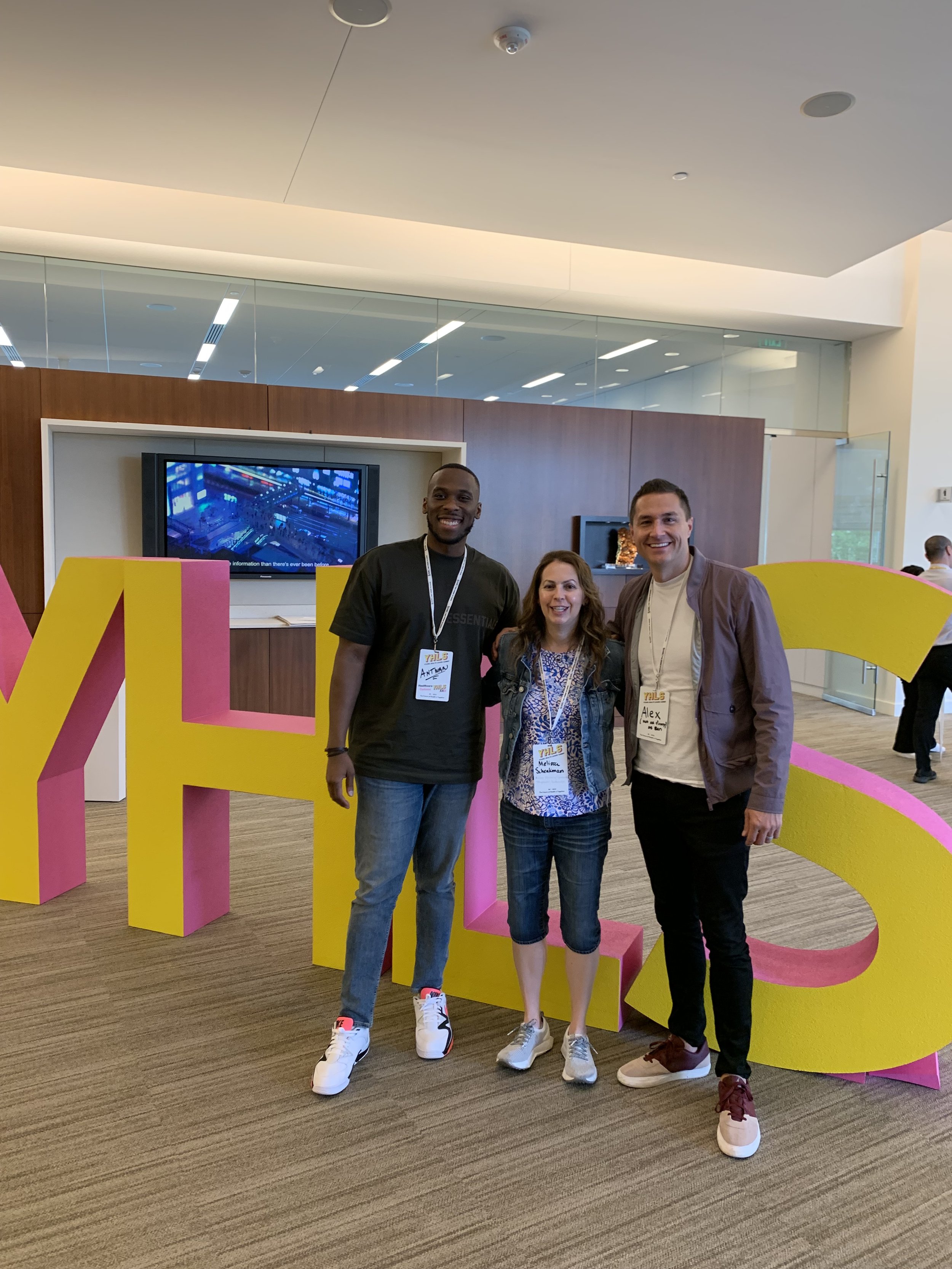Lessons Learned from the 2023 Young Health Leader Summit
Written by Melissa Schenkman, MPH, MSJ
The Co-founders of the Advancement League and Co-chairs of the 2023 Young Health Leader Summit, Antwan Williams (left) and Alex Maiersperger (right) with Melissa on the SAS Institute campus in Cary, North Carolina.
It is not every day you can go to a conference and say you had a life-changing experience. For me, that’s exactly what happened when I attended the Young Health Leader Summit (YHLS) in Cary, North Carolina earlier this month.
I think what gets so lost in our overly and unnecessarily complicated healthcare system is that there are many different people on completely different sides of healthcare working hard every day all with the same goal: to make the system effectively work for patients (which ultimately each of us are).
The YHLS brought together young people from the clinical side, patient advocacy, health technology, health consultancy firms that work with large health systems, the business side of healthcare, healthcare policy, pharmaceutical companies, and nonprofits. All in the same room!
Here are my five takeaways from days filled with big panel discussions, small group sessions, informal discussions, lunches, and teaming up with ~25 fellow young health leaders to impact change in the Raleigh-Durham community in a 24-hour competition:
#1 Get to know people’s story.
Whether a person is as high up as the CEO of a pharmaceutical company, a contractor at a consultancy firm, or in patient advocacy, everyone has a unique story that drove them to choose a career in healthcare. You should take the time to ask them about it. Then, stop and listen intensely. Their answer will surprise you and their passion for helping others will inspire you to do even more in your own work to improve the healthcare system.
#2 Everyone is welcome at the table. You just have to find the courage to pull up a chair.
It’s often thought that people who are at a higher level in their careers do not value the voices of those of us with less seniority. From my first lunch at the YHLS, I can tell you that is simply not true. You just have to pull up a chair at the table and start talking. When you share your experience, your number of years in the workforce, or your title, it’s not what matters. It’s your words that do.
I sat down at a table where, unknowingly, I had the privilege of having lunch with three people who are the heads of their own companies with significantly more years in their respective industries than I have. Yet my words about my experience interviewing patients were thoughtfully listened to with interest as they discussed how a standardized system to track patient experience data nationwide is vital to change health outcomes but has not existed to this day.
#3 There are many avenues to get to your destination.
So many of us have been taught from an early age that we can only be directly involved in healthcare by providing care directly. While you can become a nurse, doctor, physician assistant, etc., there are many other ways you can directly impact patient care around the country. This was a common theme throughout the YHLS, which made me think deeply about my friends in the industry looking for ways to continue in medicine, but in wide-reaching non-clinical roles.
If you haven’t explored other avenues, now is the time. From bringing your expertise to design health technology that offers new ways to monitor health conditions and provide preventive care, to designing systems to capture cancer data so it is widely shared between healthcare systems to improve treatments, and more, there is a role that everyone’s expertise can play.
#4 Things are not always what you think.
I spent many years doing research in the area of childhood obesity prevention, so I was excited about attending the panel entitled, “Let Food Be Thy Medicine.” One of the speakers, Ashley Tyrner, Founder of a company called Farmbox Rx, spoke about how people assume that people of lower socioeconomic status do not want to be or eat healthy, and that is why they are overweight. The truth is, she said, many want to they just can’t afford it. Pointing this out made me think that it’s not always about a lack of knowledge or education, which we often think from the outside looking in. To truly improve health outcomes we need to throw the common stereotypes out the window and take a fresh look at people’s daily circumstances.
#5 When we work together, the sky is the limit on what we can achieve.
Achieving what we want in healthcare can get derailed by red tape and by only having people with the same expertise in the room. When you bring together all sides of the industry and put everyone on a level playing field, like at YHLS, the sky is the limit. I know this because of participating in the 24-hour Community Impact Competition.
My team was made up of Masters of Health Administration students nearing graduation, people in management at hospitals, people from consultancy at Deloitte, Family Medicine doctors, business owners, health technology specialists, a healthcare writer and researcher (me), and many more. Yet, with all these different levels and areas of experience, we managed to not only come up with an idea to impact the health of the Raleigh-Durham community for years to come, but we won the competition. When you bring many different voices to the table and work together, anything is possible.
If you are interested in learning more about the Young Health Leader Summit or the Advancement League, please email us here.
Subscribe to the YMyHealth newsletter to stay up to date on everything that’s health-related for millennials!


